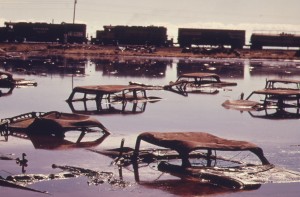In a Nautilus Q&A conducted by John Steele, which focuses on the valuation of nature, Cambridge economist Sir Partha Dasgupta offers up a dismal view of our future:
“Question:
What do you think the world will look like in 50 years?
Sir Partha Dasgupta:
I’m pretty pessimistic. I don’t believe humanity is going down the tube; that is meaningless. There will be always some rich people who will overcome the problems that we will face, and enough rich people. But I think the idea that we are in a universal movement towards progress, for example the idea that we will eliminate poverty in 10 years, 15 years, yes, we can do it for a short period, but the way we are attacking nature, the way we are handling nature, she’s biting back. She bites back at the local level; we already know that. Catastrophe is not a feature of the future. Villages have been wiped out in various parts of the world, as we know, over the decades, civil unrest, civil war amongst tribes, neighbors, which we have seen in our own time, are not exactly unrelated to resource scarcities. These are battles for resources. The epiphenomenon might be cultural divides and so forth, but at the end of the day when you’re very poor you worry about who’s going to feed your child, and our baser instincts, our nobler instincts are suppressed. So in my judgment we have seen enough of that. To think that those things can be cured on a large-scale basis, I don’t have many hopes because we are doing enormous damage to the oceans, we have done enormous damage. Obviously the theme of this conference in large measure has been over climate, and God knows what we have in store in 30, 40 years’ time.
Now, it doesn’t really mean that, as I say, the idea isn’t like that we’re all like lemmings, we all fold under the roof. No, it’s not going to happen like that. The richest parts of the world will find ways, because they have enough resources to be able to overcome the difficulties, at least in some measure. They may not be able to prosper as much. But I hate to think what’s going to happen in the drier parts of the world, sub-Saharan Africa, Northern India. I don’t know what will happen there, but to think that it’s all progress ahead of us if we get our institutions right, I think probably we are a bit too late for that. Many of these processes have very long-term irreversibilities. I mean, my climate science friends tell me that even if you were to have a zero emission now, the cumulative effect of the past will come to terrorize us in some form or the other in the future. So I think we’re going to see deep poverty in various parts of the world, even as we move in whatever direction we have to move, because we’ve set in motion processes which are amazingly tenacious, some of them being our own habits. I don’t think we have in the modern era come to terms with the fact that collective action is required with the greatest urgency at every level, community level, and there is collective action at the community level; we see it everywhere in some form. At the national level far less so, and of course at the international level we see mainly disappointments. So we’ll survive, but this idea of progress which we have become accustomed to over a 250-year period since the beginning of the industrial revolution, certainly in the past 60, 70 years, I mean since the end of the Second World War, there’s been this very optimistic and rightly so, optimistic view with the knowledge that we had that reasoned behavior will take us there, but we’ve been using the wrong metric.”

